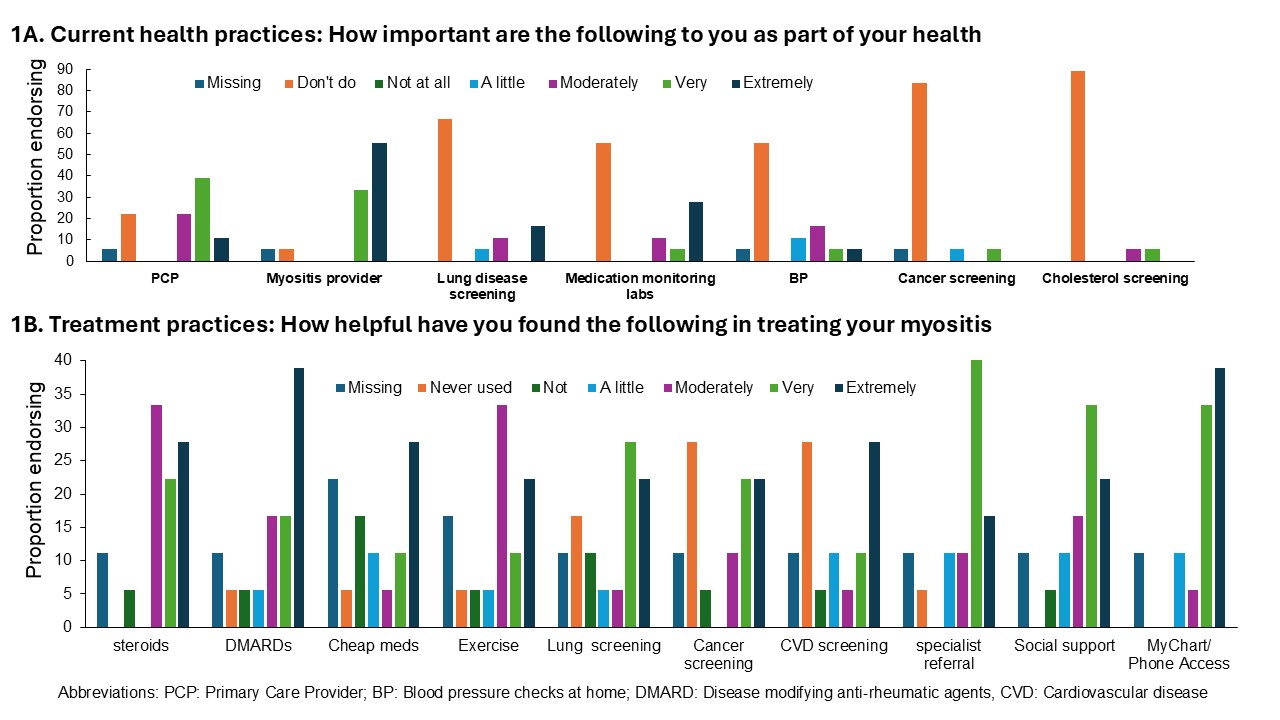Session Information
Date: Monday, October 27, 2025
Title: (1248–1271) Patient Outcomes, Preferences, & Attitudes Poster II
Session Type: Poster Session B
Session Time: 10:30AM-12:30PM
Background/Purpose: Idiopathic inflammatory myopathies (IIM) are heterogenous autoimmune diseases requiring coordinated, patient-centered care. Understanding patient perspectives on diagnosis, treatment, health screening, and barriers to care is essential for optimizing outcomes and improving patient-centered care. We conducted a survey to assess IIM patient attitudes towards treatment, screening, and barriers to care at the University of North Carolina at Chapel Hill Rheumatology clinic.
Methods: A single anonymous survey with two open-ended and 16 discrete questions was developed to elicit perceptions of multimorbidity, a specific focus on screening, and obstacles to care. Patients with IIM were screened for eligibility from chart review prior to their rheumatology clinic appointment and provided with survey access information at the time of the appointment. Participant responses to open ended questions were analyzed with inductive thematic coding by two reviewers.
Results: Of 62 patients seen during routine ambulatory rheumatology care, 16 completed the survey. Most respondents were female (56%) and working (61%, Table 1). Most participants obtained health information from their IIM provider (94%) followed by their primary care provider (61%). Half of participants did not understand the purpose of one or more of their medications, and a third reported high cost or co-pay of one or more of their medications. Most respondents did not endorse participating in screening practices (Figure 1A). Participants endorsed electronic/phone access to care team, disease modifying anti-rheumatic agents and exercise as components they found helpful in managing their myositis (Figure 1B). For current and future resources, participants noted the electronic patient portal (56%), an exercise program (44%), and educational handouts on IIM (50%) as extremely helpful (Figure 2). Regarding what participants wished their myositis provider understood about their condition, participants discussed uncertainty, “it comes and goes;” “[it] creates feelings of inaptitude and unreliability” and “…it seems my muscle pains are dismissed since my bloodwork doesn’t show increases in certain levels.” Regarding what participants would improve about their myositis, many responses focused on a cure, while others expressed a desire to understand “understanding what I was feeling and facing would help me understand more clearly” and apply disease understanding to decrease flares: “what preventative actions I can take to prevent a flare other than medicinal.”
Conclusion: In this single center survey, we found patients with IIM did not participate in screening (e.g. cancer, cardiovascular). Participants expressed uncertainty/unpredictability as obstacles to care and cited MyChart as helpful alongside a desire for informational handouts. These findings highlight the importance of targeted patient education and proactive communication by rheumatologists to address informational gaps and support long-term care engagement.
To cite this abstract in AMA style:
Patolia S, Alvarez C, Grant J, Mihas P, Schwartz T, Foulke G, Nelson A, Allenzara A. Overcoming Obstacles to Care: Survey of Adult Patients with Idiopathic Inflammatory Myopathies (IIM) [abstract]. Arthritis Rheumatol. 2025; 77 (suppl 9). https://acrabstracts.org/abstract/overcoming-obstacles-to-care-survey-of-adult-patients-with-idiopathic-inflammatory-myopathies-iim/. Accessed .« Back to ACR Convergence 2025
ACR Meeting Abstracts - https://acrabstracts.org/abstract/overcoming-obstacles-to-care-survey-of-adult-patients-with-idiopathic-inflammatory-myopathies-iim/


.jpg)
.jpg)